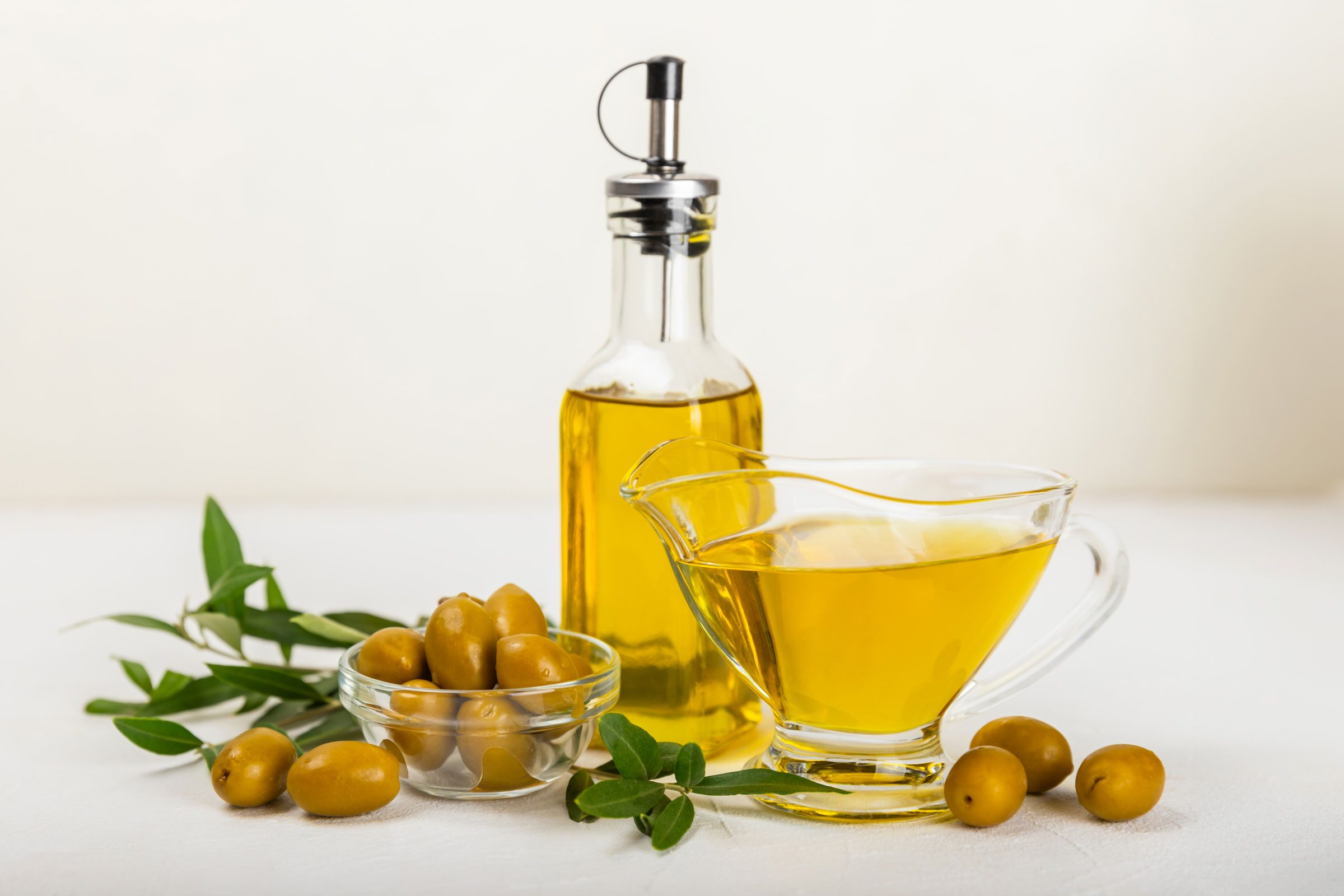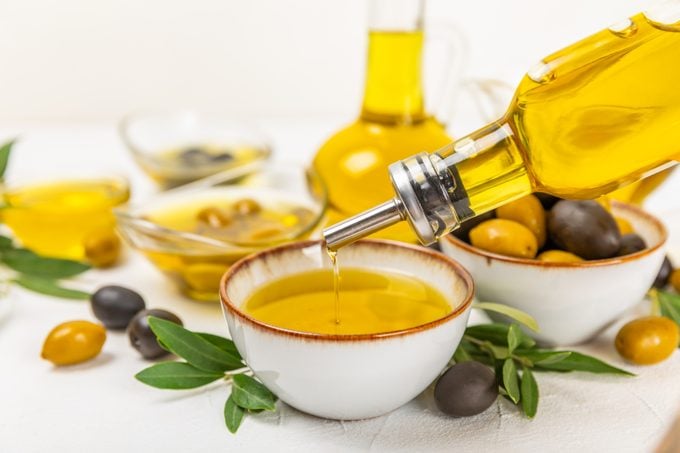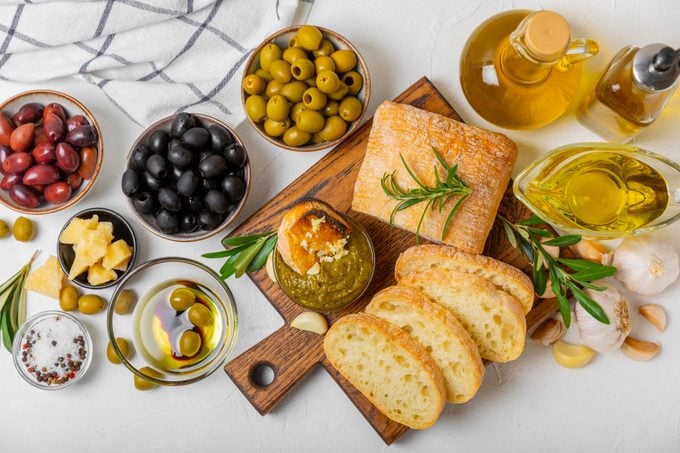When do you use olive oil vs. extra virgin olive oil? We'll share the differences in taste and various uses in cooking.

What Is the Difference Between Olive Oil and Extra Virgin Olive Oil?

Staring at all the olive oil options at the grocery store gets intimidating. Unlike vegetable oil or canola oil, there seem to be so many brands of olive oil. Then there are the various types: cold-pressed, virgin, extra virgin, refined and extra light.
Which one should you choose?
This golden oil purportedly helps prevent many major diseases and is credited with a variety of health benefits, but much of that can depend on the type of olive oil you buy. Let’s go over the basics of olive oil vs. extra virgin olive oil, and learn when it’s best to choose one over the other.
Also, check here the types of olives all devotees must try in their lives.
What is olive oil?
Olive oil is produced by crushing the ripened fruit of the olive tree. Olive trees as we know them date back thousands of years, and historians believe that humans have been making and consuming olive oil for more than 6,000 years. Some fossils suggest that relatives of the olive tree were around millions of years ago. The olive tree is native to Asia Minor but eventually spread across the entire Mediterranean basin. Most of the world’s olive oil is still produced in those regions.
The oil is liquid at room temperature, but solidifies when cold. Olive oil is a crucial component of the super-healthy Mediterranean diet and is one of the primary cooking fats in Greece, Spain and Italy, among other places.
Regular olive oil, which can’t be labelled “virgin” or “extra virgin,” is more refined—aka less flavorful—than virgin oil, and may have been heated during production. It is considered to be a lower grade of olive oil. It can be made using olives that had defects in flavor, but because it is refined, those flavor notes will not be noticeable in the finished product.
What does olive oil taste like?

Regular olive oil will have some of the characteristics of the olives from which it was made, but because of the way the oil is produced, the flavor will generally be comparatively smooth and mild. As the oil is heated and refined, the compounds that give olive oil its unique and interesting flavors are removed.
How do you use olive oil?
Non-virgin olive oil can be great as a cooking oil. It can be used to saute vegetables or in marinades for meats (although virgin oils are great for those tasks too).
There is debate about whether olive oil should ever be used for frying as it has a lower smoke point than peanut oil, canola oil, corn oil and other oils prized for use in super hot applications. A refined olive oil will likely have a higher smoke point than one that is unrefined and will definitely have a higher smoke point than an oil that is unfiltered. To settle any confusion, we have a guide on cooking oils that discusses all sorts of uses and applications.
What is extra virgin olive oil?
Extra virgin is a classification for olive oil that has been produced by cold mechanical extraction—such as by grinding with stones—and without the use of chemicals (some much lower quality olive oils are processed with a chemical treatment).
To qualify as extra virgin, the oil must also receive high marks for its flavor and have a low percentage of free oleic acid. Cold-pressed extra virgin olive oil retains much more of the nutrients that offer the health benefits touted by olive oil. Oil that is cold pressed and doesn’t merit the extra virgin designation can be sold as virgin oil.
What does extra virgin olive oil taste like?
Extra virgin olive oil is made from the same types of olives as regular olive oil, but it’s a grade reserved for the most delicious batches. Virgin oils will taste different depending on the kind or kinds of olives that were pressed to make it and how ripe the olives were at harvest time.
Some virgin olive oils are smooth and buttery tasting, but many have peppery and grassy notes, and will cause a little tickle in the back of the throat. Certain olive oil packages list information about the flavor profile of the oil within.
How do you use extra virgin olive oil?

The top-flight flavor means that extra virgin oil is superb for taste-forward applications such as drizzling over salads or as a dip for breads. Because extra virgin oil is more expensive than its virgin counterpart, budget-conscious cooks might want to save it for times when its flavor will truly stand out. However, if you’ve got cash or you’re budgeting for healthier foods, extra virgin olive oil can be your go-to oil for low to medium temperature cooking.
Extra virgin olive oil is considered one of the healthiest fats. However, because of its robust flavor, olive oil is not an all-purpose oil. If you want the health benefits of olive oil without the zing, it can be combined with neutral or nutty-tasting oils such as sunflower or grape seed.
Solo, olive oil is excellent in Mediterranean dishes such as hummus, pesto and gazpacho. Starchy foods pair well with the oil’s rich and sharp taste, so choose olive oil for tossing with pasta, making pizza dough or as a dip for bread. It is also an important part of the dressing for tabbouleh.
Extra virgin oil can be used in sauces and for cooking in place of regular olive oil, if desired.
Olive Oil vs. Extra Virgin Olive Oil
So, regular olive oil is refined and may be produced using heat. Virgin and extra virgin oil are very similar to each other, but the extra virgin version has the finest flavor.
If you’re a cost-conscious cook, it can be great to use a less pricey oil for pan cooking and in sauces, but keep a bottle of extra virgin olive oil around for use in salad dressings and as a healthy drizzle on top of soups, a dip for bread and so on. Choose virgin olive oil as a middle-of-the-road option for cooking and save the fanciest stuff for special occasions.
If price is no object and you only want to keep one bottle of oil on the shelf, go for the extra virgin. It can be used in all of the same ways as other olive oils, but will be particularly delicious. In addition, extra virgin oil is purported to have the most health benefits.
Don’t forget that some olive oils are buttery and well-rounded, while others are grassy or peppery and piquant. Finding the flavor of olive oil that you like most may be even more important than whether it’s virgin or extra virgin!
Whichever you choose, make sure you store the olive oil properly.


















